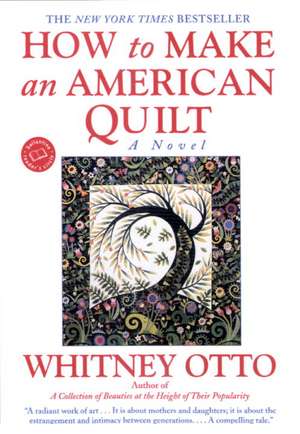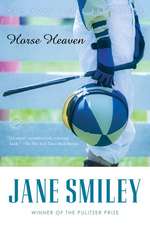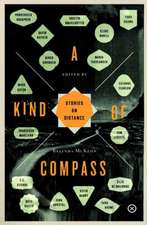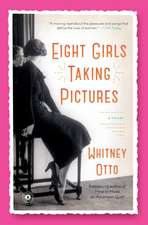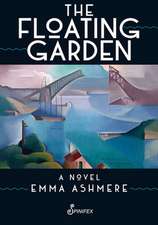How to Make an American Quilt
Autor Whitney Ottoen Limba Engleză Paperback – 31 mar 1994
THE NEW YORK TIMES BOOK REVIEW
An extraordinay and moving reading experience, HOW TO MAKE AN AMERICAN QUILT is an exploration of women of yesterday and today, who join together in a uniquely female experience. As they gather year after year, their stories, their wisdom, their lives, form the pattern from which all of us draw warmth and comfort for ourselves.
A MAJOR MOTION PICTURE COMING OUT FALL 1995
-- with Maya Angelou, Winona Ryder, and Rip Torn
Preț: 107.46 lei
Nou
Puncte Express: 161
Preț estimativ în valută:
20.56€ • 21.47$ • 16.98£
20.56€ • 21.47$ • 16.98£
Carte disponibilă
Livrare economică 25 martie-08 aprilie
Preluare comenzi: 021 569.72.76
Specificații
ISBN-13: 9780345388964
ISBN-10: 0345388968
Pagini: 240
Dimensiuni: 137 x 208 x 10 mm
Greutate: 0.25 kg
Editura: BALLANTINE BOOKS
ISBN-10: 0345388968
Pagini: 240
Dimensiuni: 137 x 208 x 10 mm
Greutate: 0.25 kg
Editura: BALLANTINE BOOKS
Extras
At first,I thought I ould study art.Art history,to be exact. Then I thought,No,what about physical anthropology?--a point in my life thereafter referred to as My Jane Goodall Period.I tried to imagine my mother,Sarah Bennett-Dodd (called Sally by everyone with the exception of her mother),camping with me in the African bush,drinking strong coffee from our battered tin cups,much in the way that Jane did with Mrs.Goodall.I saw us laid up with match- ing cases of malaria;in mother/daughter safari shorts;our hands weathering in exactly the same fashion. Then,of course,I remembered that I was talking about my mother,Sally,who is most comfortable with modernity and refuses to live in a house that anyone has lived in before,exposing me to a life of tract housing that was curious and awful.
Literature was my next love.Until I became loosely acquainted
with critical theory,which struck me as a kind of intellectualism for
its own sake.It always seems that one has to choose literature or
critical theory,that one cannot love both.All of this finally pushed
me willingly (I later realized)into history.
I began with the discipline of the time line --a holdover from
elementary school --setting all the dates in order,allowing me to fix
time and place.History needs a specific context,if nothing else.My
time lines gradually grew more and more ornate,with pasted-on
photographs and drawings that I carefully cut from cheap history
books possessing great illustrations but terrible,unchallenging
text.I was taken with the look of history before I arrived at the
"meat "of the matter.But the construction of the time line is both
horizontal and vertical,both distance and depth.Which,finally,
makes it rather unwieldy on paper.What I am saying is that it
needed other dimensions,that history is not a matter of dates,and
only disreputable or unimaginative teachers take the "impartial "
date approach,thereby killing all interest in the subject at a very
early age for many students.
(I knew,in a perfect world,I would not be forced to choose a
single course of study,that I would have time for all these interests.
I could gather up all my desires and count them out like valentines.)
The Victorians caught my eye almost instantly with their
strange and sometimes ugly ideas about architecture and dress and
social conventions.Some of it was pure whimsy,like a diorama in
which ninety-two squirrels were stuffed and mounted,enacting a
basement beer-and-poker party,complete with cigars and green
visors pulled low over their bright eyes;or a house that displayed a
painting of cherubs,clad in strips of white linen,flying above the
clouds with an identical painting hidden,right next to it,under a
curtain in which the same cherubs --babies though they were --are
completely nude.Or a privileged Texas belle 's curio cabinet that
contained a human skull and blackened hand.Or still another
young woman (wealthy daughter of a prominent man)who insisted
on gliding through the family mansion with a handful of live kittens
clinging to the train of her dress.
I enrolled in graduate school.Then I lost interest.I cared and
then I didn 't care.I wanted to know as much about the small,odd
details that I discovered here and there when looking into the past
as I did about Lenin 's secret train or England 's Victorian imperial-
ism or a flawless neo-Marxist critique of capitalism.
There were things that struck me as funny,like the name
Bushrod Washington,which belonged to George 's nephew,or the
man who painted Mary Freake and her baby,known only as the
Freake Limner.And I like that sort of historical gossip;I mean,is it
true that Catherine the Great died trying to copulate with a horse?
And if not,what a strange thing to say about someone.Did Thomas
Jefferson have a lengthy,fruitful affair with his slave Sally Hem-
ings?What does that say about the man who was the architect of the
great democratic dream?What does it say about us?Did we inherit
the dream or the illicit,unsettling racial relationship?
This sort of thing is not considered scholarly or academic or of
consequence,these small footnotes.And perhaps rightly so.Of
course,I loved the important,rigorous historical inquiry as well.
What I think I wanted was both things,the silly and the sublime;
which adds up to a whole picture,a grudgingly true past.And out of
that past truth a present reality.
You could say I was having trouble linking the two.
I wished for history to be vital,alive with the occasional quirk
of human nature (a little "seriojovial ");I imagined someone saying
to me, Finn,what ever gave you the idea that history was any sort of liv-
ing thing?Really.Isn 't that expectation just the least bit contradictory?
Then Sam asked me to marry him.
It seemed to me a good idea.
Yet it somehow led me back to my educational concern,which
was how to mesh halves into a whole,only in this case it was how to
make a successful link of unmarried to married,man to woman,the
merging of the roads before us.When Heathcliff ran away from
Wuthering Heights,he left Cathy wild and sad,howling on the
moors,I am Heathcliff,as if their love were so powerful,their souls
so seamlessly mated,that no division existed for them,save the cor-
poreal (though I tend to believe they got "together "at least once),
which is of little consequence in the presence of the spirit.
All of which leaves me wondering,astonished,and a little put
off.How does one accomplish such a fusion of selves?And,if the af-
fection is that strong,how does one avoid it,leaving a little room for
the person you once were?The balance of marriage,the delicate,
gentle shifting of the polished scales.
Let me say that I like Sam tremendously.I love him truly.
The other good idea was spending the summer with my grand-
mother Hy Dodd and her sister Glady Joe Cleary.Their relationship
with me is different from that with the other grandchildren;we
share secrets.And I probably talk to them a little more than my
cousins or their own children do.I think they have a lot to say and I
am more than willing to hear it.All of it.Whatever strikes them as
important.
To me,they are important.
So my days are now spent watching the quilters come and go,
lazily eavesdropping on the hum of their conversation and drifting
off into dreams on my great-aunt 's generous porch;thinking about
my Sam,my sweetheart.Or lying on my back,in the shade,in Aunt
Glady 's extravagant garden,removing the ice cubes from my tea,
running them across my face,neck,and chest in an effort to cool
down from the heat.
I could wander over to the Grasse swimming pool,but it is al-
ways so crowded.Sophia Richards says you never know who you 'll
meet there --as if I want to meet anyone.As if I am not already stay-
ing in a house that has quite a bit of "foot traffic."
The quilters have offered to make a bridal quilt in honor of my
marriage,but I tell them to Please continue with what you are doing as
if I never arrived to stay for the summer .Sometimes I say, I can 't think
about that now (as if anyone can think clearly in this peppery heat).I
can see this puzzles them,makes them wonder what sort of girl it is
who "cannot think about " her own wedding..
This amuses me as well,since,at age twenty-six,I have lost
track of the sort of girl that I am.I used to be a young scholar;I
am now an engaged woman.Not that you cannot be both --even I
understand that --yet I cannot fathom who I think I am at this time.
Literature was my next love.Until I became loosely acquainted
with critical theory,which struck me as a kind of intellectualism for
its own sake.It always seems that one has to choose literature or
critical theory,that one cannot love both.All of this finally pushed
me willingly (I later realized)into history.
I began with the discipline of the time line --a holdover from
elementary school --setting all the dates in order,allowing me to fix
time and place.History needs a specific context,if nothing else.My
time lines gradually grew more and more ornate,with pasted-on
photographs and drawings that I carefully cut from cheap history
books possessing great illustrations but terrible,unchallenging
text.I was taken with the look of history before I arrived at the
"meat "of the matter.But the construction of the time line is both
horizontal and vertical,both distance and depth.Which,finally,
makes it rather unwieldy on paper.What I am saying is that it
needed other dimensions,that history is not a matter of dates,and
only disreputable or unimaginative teachers take the "impartial "
date approach,thereby killing all interest in the subject at a very
early age for many students.
(I knew,in a perfect world,I would not be forced to choose a
single course of study,that I would have time for all these interests.
I could gather up all my desires and count them out like valentines.)
The Victorians caught my eye almost instantly with their
strange and sometimes ugly ideas about architecture and dress and
social conventions.Some of it was pure whimsy,like a diorama in
which ninety-two squirrels were stuffed and mounted,enacting a
basement beer-and-poker party,complete with cigars and green
visors pulled low over their bright eyes;or a house that displayed a
painting of cherubs,clad in strips of white linen,flying above the
clouds with an identical painting hidden,right next to it,under a
curtain in which the same cherubs --babies though they were --are
completely nude.Or a privileged Texas belle 's curio cabinet that
contained a human skull and blackened hand.Or still another
young woman (wealthy daughter of a prominent man)who insisted
on gliding through the family mansion with a handful of live kittens
clinging to the train of her dress.
I enrolled in graduate school.Then I lost interest.I cared and
then I didn 't care.I wanted to know as much about the small,odd
details that I discovered here and there when looking into the past
as I did about Lenin 's secret train or England 's Victorian imperial-
ism or a flawless neo-Marxist critique of capitalism.
There were things that struck me as funny,like the name
Bushrod Washington,which belonged to George 's nephew,or the
man who painted Mary Freake and her baby,known only as the
Freake Limner.And I like that sort of historical gossip;I mean,is it
true that Catherine the Great died trying to copulate with a horse?
And if not,what a strange thing to say about someone.Did Thomas
Jefferson have a lengthy,fruitful affair with his slave Sally Hem-
ings?What does that say about the man who was the architect of the
great democratic dream?What does it say about us?Did we inherit
the dream or the illicit,unsettling racial relationship?
This sort of thing is not considered scholarly or academic or of
consequence,these small footnotes.And perhaps rightly so.Of
course,I loved the important,rigorous historical inquiry as well.
What I think I wanted was both things,the silly and the sublime;
which adds up to a whole picture,a grudgingly true past.And out of
that past truth a present reality.
You could say I was having trouble linking the two.
I wished for history to be vital,alive with the occasional quirk
of human nature (a little "seriojovial ");I imagined someone saying
to me, Finn,what ever gave you the idea that history was any sort of liv-
ing thing?Really.Isn 't that expectation just the least bit contradictory?
Then Sam asked me to marry him.
It seemed to me a good idea.
Yet it somehow led me back to my educational concern,which
was how to mesh halves into a whole,only in this case it was how to
make a successful link of unmarried to married,man to woman,the
merging of the roads before us.When Heathcliff ran away from
Wuthering Heights,he left Cathy wild and sad,howling on the
moors,I am Heathcliff,as if their love were so powerful,their souls
so seamlessly mated,that no division existed for them,save the cor-
poreal (though I tend to believe they got "together "at least once),
which is of little consequence in the presence of the spirit.
All of which leaves me wondering,astonished,and a little put
off.How does one accomplish such a fusion of selves?And,if the af-
fection is that strong,how does one avoid it,leaving a little room for
the person you once were?The balance of marriage,the delicate,
gentle shifting of the polished scales.
Let me say that I like Sam tremendously.I love him truly.
The other good idea was spending the summer with my grand-
mother Hy Dodd and her sister Glady Joe Cleary.Their relationship
with me is different from that with the other grandchildren;we
share secrets.And I probably talk to them a little more than my
cousins or their own children do.I think they have a lot to say and I
am more than willing to hear it.All of it.Whatever strikes them as
important.
To me,they are important.
So my days are now spent watching the quilters come and go,
lazily eavesdropping on the hum of their conversation and drifting
off into dreams on my great-aunt 's generous porch;thinking about
my Sam,my sweetheart.Or lying on my back,in the shade,in Aunt
Glady 's extravagant garden,removing the ice cubes from my tea,
running them across my face,neck,and chest in an effort to cool
down from the heat.
I could wander over to the Grasse swimming pool,but it is al-
ways so crowded.Sophia Richards says you never know who you 'll
meet there --as if I want to meet anyone.As if I am not already stay-
ing in a house that has quite a bit of "foot traffic."
The quilters have offered to make a bridal quilt in honor of my
marriage,but I tell them to Please continue with what you are doing as
if I never arrived to stay for the summer .Sometimes I say, I can 't think
about that now (as if anyone can think clearly in this peppery heat).I
can see this puzzles them,makes them wonder what sort of girl it is
who "cannot think about " her own wedding..
This amuses me as well,since,at age twenty-six,I have lost
track of the sort of girl that I am.I used to be a young scholar;I
am now an engaged woman.Not that you cannot be both --even I
understand that --yet I cannot fathom who I think I am at this time.
Descriere
With all of the appeal and the rich narrative drive of The Joy Luck Club, this marvelous novel's inventiveness and gripping universality are the st uff of which literary sensations are made. Otto interweaves stories of a California quilting group with seven sets of instruction in the quilting process, ultimately conveying the significant passages in women's lives.
Notă biografică
Whitney Otto
